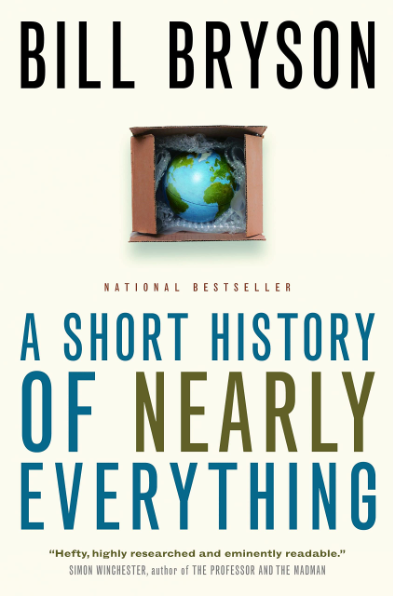
This book by Bill Bryson delivers what it promises in the sense that it tells the history of nearly everything that is pretty awesome to know about the universe, the human body, microscopic creatures, evolution, meteorites, the beginning of life, and the ending of many species existences, including ours someday in the future – and we are pretty sure that’s going to happen one day.
Starting with the Big Bang, the origin of literally everything, the author shows in a scientific and funny way many theories that split the scientific community about this topic; what they have in common and their major differences, always very didactic and humorous.
What I most enjoyed is the historic path concerning many theories and their evolution. Gravity as Newton theorized about was not seen and understood in the same way by Albert Einstein; between almost 400 years separating both genii, many other known genii theorized and understood the phenomena and collaborate to make our understanding of our world a team work. This is science: a huge collective enterprise where people collaborate, criticize, agree, and disagree and make humanity go forward on learning and developing knowledge and technology.
A full-packed book with lots of interesting stuff, so I really recommend you to take notes. It’s a great way to fix information in your brain and make associations and “mind maps” the same way the author links each subject with the next chapter and topic.
How a bacteria caught in a unicellular being millions of years ago became the mitochondria in our cells? How their genetic material is different from the one at the nucleus? Is it possible one day we face extinction because of a meteorite? Can volcanoes explode and end a huge part of life on our planet? How many extinctions homo sapiens already cause since him starting migrating? Didi we breed with Neanderthals?
There are some questions the author tries to answer not just by reading, but also through discussions with the best brains in their fields. You can be sure to have the most up-to-date knowledge about the topic you are reading about.
Some while ago, I got tired of reading romances and fiction – maybe because I read so many in my life since I was a kid. I particularly enjoyed books where science fiction was involved. I remember one of my favorites was a book about a hidden plateau in the Amazon jungle (written by probably an American) where a scientific expedition found dinosaurs and primitive cavemen and tried to survive in a completely dangerous and hostile environment far away from civilization. Of course, I don’t remember the author or how the story ends, but it was fun reading because of the dinosaurs and cavemen. My new passion is scientific books written for non-scientist people like myself (and with no dinosaurs alive in the 21st century). Science is amazing because it explains everything, and if it doesn’t for now, it will do it one day.
The author creates less polemic when debating some subjects related to religion, different from Yuval Noah Harari (read my previous book about 2 of his books here) when talking about religion for example. Harari is categoric and affirm religion is a product of human imagination and defines himself many times as an atheist, is his books and interviews. Bryson doesn’t go deep on this kind of discussion, but sometimes he left understand he is a kind of agnostic person as we said in an interview: “I’m not a spiritual person, and the things I’ve done haven’t made me one, but the one thing I did appreciate when I was writing A Short History was that conventional science and a belief in god are not incompatible“. The books by Bill Bryson ( I started already “The Body – a guide for the occupants” that will be the subject of my next future post) are entertaining and will make you better at conversations and a more interesting person. What is fun is that knowledge we can always keep accumulating, and the brain will never become full as a hard drive where you have to erase stuff to stock more. That is a major advantage we get when we became homo sapiens and developed our neocortex. And yes, the author talks about this in this book as well 😊 hope you enjoy the reading as I enjoyed it.
